Competition Commission of India
Union Finance & Corporate Affairs Minister Smt. Nirmala Sitharaman participates in the 13th Annual Day commemoration of the Competition Commission of India
Smt. Sitharaman outlines challenges to competition in global and Indian contexts
Union Finance Minister virtually inaugurates regional office at Kolkata; launches an upgraded website of CCI; and releases CCI’s Competition Advocacy Booklets translated into Kannada and Malayalam
Posted On:
20 MAY 2022 6:02PM by PIB Delhi
Union Minister of Finance and Corporate Affairs Smt. Nirmala Sitharaman participated in the 13th Annual Day commemoration of the Competition Commission of India (CCI) as Chief Guest in New Delhi, today.
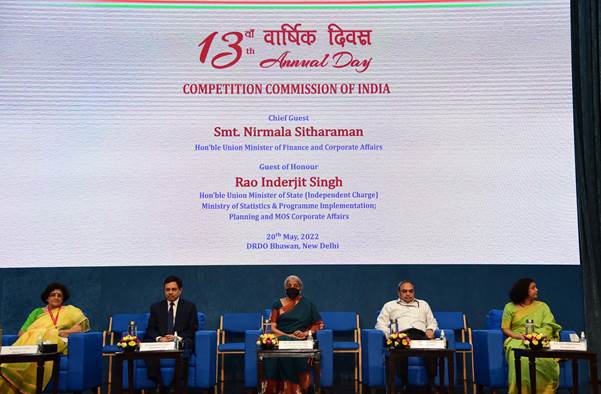
On this occasion, the Union Finance Minister inaugurated the regional office at Kolkata and launched an upgraded website of CCI.
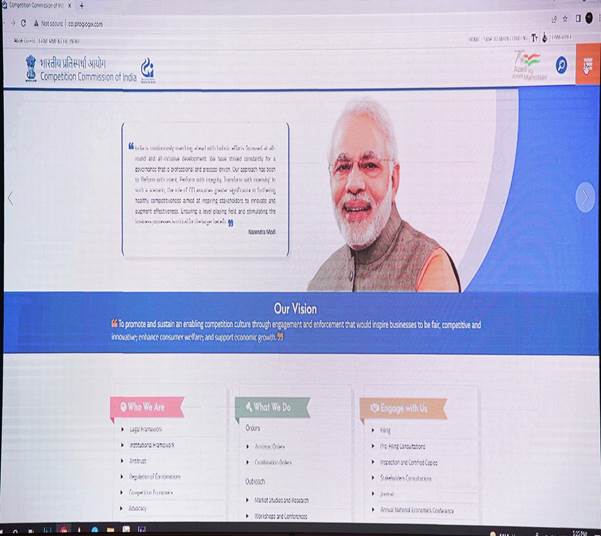
Smt. Sitharaman also released CCI’s Competition Advocacy Booklets translated into Kannada and Malayalam.
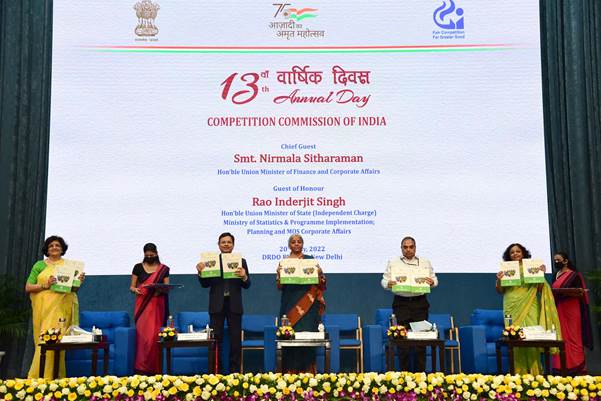
In her address, Smt. Sitharaman appreciated the CCI for taking timely initiatives during the peak of the pandemic to ensure continuity of regulatory work. The CCI stood the test of time and expectations of stakeholders, she said. The Finance & Corporate Affairs Minister also appreciated CCI leadership and wished the Commission the very best, especially as India moves towards Amrit Kaal, the 25 years leading to India@100.
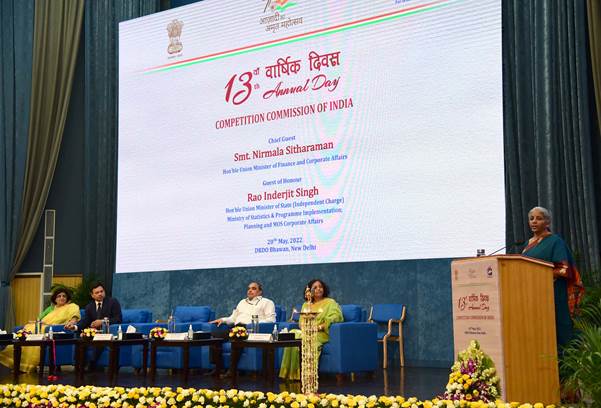
Smt. Sitharaman underlined three actionable areas to achieve the public policy goal of competition. First, she emphasised that, in order to speed up recovery, companies need to scale up. She said that scaling up is already happening, and CCI should have a proactive understanding of what is shaping markets in this process, especially in M&As.
Second, the Finance Minister said that, in today’s context, when the government is pushing infrastructure growth to scale up demand, there is a possibility of threat from cartelisation. She underlined her concerns that input costs are rising despite India having a huge capacity to cater to both domestic and export demands. Smt. Sitharaman highlighted that there is a global shortage of commodities due to the pandemic, and now, following the war in Eastern Europe, the supply chain has been adversely affected. She said that there is a need to look into these and ensure that there are no monopolistic/duopolistic tendencies leading to price rise and supply side manipulations.
Third, Smt. Sitharaman spoke about the challenges posed by digitisation. She said that India has made a brand name for itself, be it in fintech or in adopting digital tools such as artificial intelligence and Internet of Things (IoTs). She particularly cited how Aadhar, India Stack, and other necessary digital public infrastructure support have been harbingers of the digital revolution. The Finance Minister called upon CCI to understand the technological nuances of the new digital era and whether these markets are being fairly, effectively, and transparently used for the benefit of consumers. Stressing the importance of transparency, Smt. Sitharaman highlighted the benefits of FAQs, which can become a permanent tool of advocacy. These FAQs should be used to disseminate information on a ready-to-use basis. This, Smt. Sitharaman said, would strengthen CCI’s position as a proactive and progressive regulator, and such guidance will help market players take preventive measures. The Finance Minister, while appreciating the role of CCI, asked it to be always sensitive but firm in its approach.
Delivering a Special Address, Shri Rajesh Verma, Secretary, Ministry of Corporate Affairs, said that CCI has made tremendous efforts to build a culture of competition in markets. He stated that competition law is a critical component of any economic regulatory architecture and infuses dynamic efficiencies. Shri Verma further mentioned that the common ideological thread of economic regulation in India has unequivocally been competition-based economic regulation. While sectoral regulations aim to structure a particular sector, the role of CCI is very important to regulate the process of competition in all aspects of the Indian market. He also outlined the robustness of the Competition Act, 2002 and various remedial measures that can be taken by CCI, but stressed that these powers be used judiciously. Shri Verma also noted the critical interventions in antitrust enforcement done by CCI over the years and that stakeholders are increasingly reposing their trust in the Commission as a forum for the redressal of competition-related concerns. He noted that, within the legal framework of the Act, CCI has already issued some landmark decisions and ordered investigations in technology markets. He recognised that such cases involve complex technological issues and pose challenges to the enforcer and investigators. To meet such challenges, CCI will need to keep itself abreast of the developments in these markets and continue to redefine the antitrust toolkit. This, according to him, would enable timely and evidence-based interventions and strike a balance, so that efficiency and innovation are not stifled and markets remain free from abuse of market power.
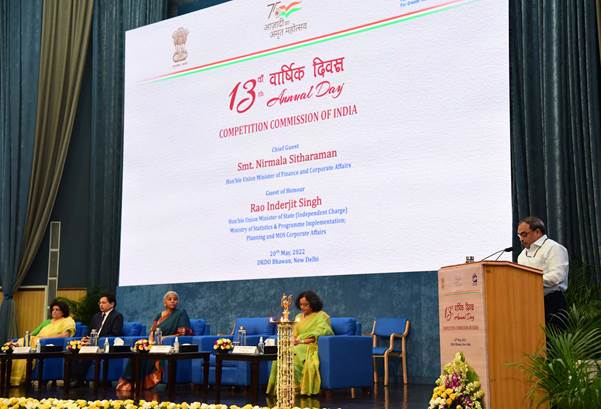
Secretary MCA also touched upon the recommendations of the Competition Law Review Committee (CLRC) in meeting the challenges posed by digital platforms, while confirming the robustness of existing provisions. Lastly, the Secretary outlined the importance of regional offices that were expected to facilitate enforcement by acting as centres for filing and receiving cases and facilitating investigation, follow-up of court cases, and online depositions in coordination with the Head Office in Delhi.
Earlier, in his welcome address, Shri Ashok Kumar Gupta, Chairperson, CCI, stated that a rebound of the economy is underway and now, more than ever, markets should perform well. Antitrust law is aimed at fostering a public good that is competition, he said. Shri Gupta expressed his confidence that the enforcement of law has been robust yet judicious, with calibrated interventions in some sectors when required, and over the last 13 years, CCI has reviewed over 1,100 antitrust cases, 900 combination filings, and held over 1,200 advocacy events. He expressed his happiness that a slow but definite change in the behaviour of firms is happening. Shri Gupta highlighted that CCI has been constantly upgrading its investigation toolkits and techniques to unravel anti-competitive conduct, which are often shrouded in secrecy. He also stated that forensic tool data analytics and dawn raids are increasingly becoming useful methods during the investigative process. Addressing the gathering, Shri Gupta also underlined the role of CCI as a facilitator in the process of expeditious assessment of combination filings, with the average time for approval of combination cases having come down to 17 working days. In over 900 combinations reviewed so far, remedies were ordered only in 2% cases, he informed the audience. Shri Gupta, while delving into the novel issues posed by digital markets, stated that new skillsets are required for investigation, adjudication, knowledge creation, and augmentation of capacities in areas such as artificial intelligence, machine learning, data analytics, algorithm design, etc. He also underpinned the need to sharpen and chisel the regulatory toolkit for both antitrust and mergers to account for data-centric ecosystems, as India has emerged as one of the biggest and fastest-growing digital consumer bases. In this process, while market distortions need to be corrected promptly, it is equally important that incentives for innovation are not compromised.
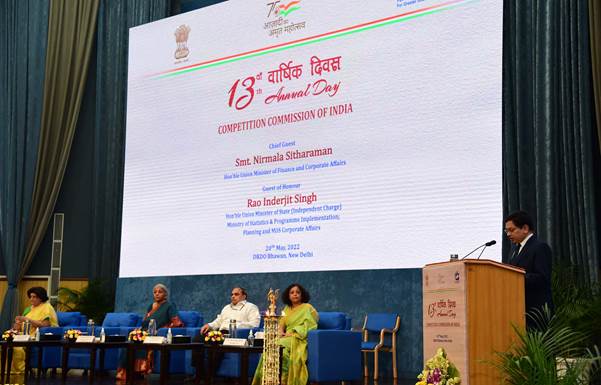
While elucidating upon the global developments in regulating digital markets, where ex-post antitrust tools are increasingly being supplemented with ex-ante measures, the Chairperson emphasised upon the importance of studying such frameworks to not only understand their modalities but also explore the feasibility of its adoption in the Indian context. Shri Gupta also highlighted the increasing use of market studies and stakeholder consultations as crucial non-enforcement tools for bridging information gaps, offering the Commission the opportunity to assess competition beyond the individual behaviour of firms and enhance knowledge about a sector or an issue. He outlined the brief contours of several market studies that have been undertaken by the Commission, including the pharmaceutical and film distribution industry studies.
Shri Gupta also touched upon the recent procedural changes that have been introduced in the confidentiality regime. The CCI General Regulations, 2009, were recently amended after a rigorous consultation process, with an objective to establish a robust information-sharing regime through the setting up of a confidentiality ring that allows parties to effectively present their cases without compromising the sanctity of commercially sensitive information.
Dr. Sangeeta Verma, Member, CCI, proposed the Vote of Thanks, and thanked the Union Finance and Corporate Affairs Minister for gracing this occasion and sharing her vision for the CCI. Shri Bhagwant Singh Bishnoi, Member, present at the Kolkata office, spoke about the role of the regional offices of the Commission and thanked Smt. Sitharaman for inaugurating the regional office at Kolkata.
The event was attended by a large number of dignitaries from the government, regulatory bodies, PSUs, industry, academia, chambers of commerce, and the legal fraternity.
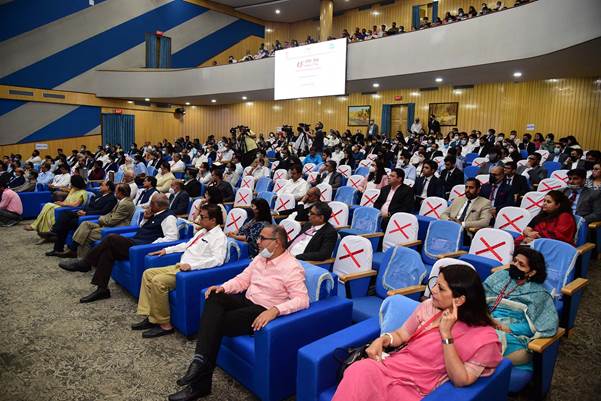
****
RM/MV/KMN
(Release ID: 1826988)